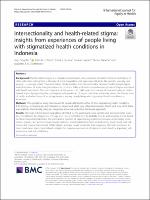Health System Responses to the Health Needs of Refugees and Asylum-seekers in Malaysia: A Qualitative Study
| Chuah, Fiona Leh Hoon
Tan, Sok Teng Yeo, Jason Legido-Quigley, Helena |
|
| 2019-05-06 | |
|
Background: This study was conducted to examine the responses and challenges in addressing the health needs of refugees and asylum-seekers in Malaysia from a health systems and policy perspective. Methods: Twenty semi-structured in-depth interviews were conducted with key informants comprising experts, healthcare professionals and program personnel with professional experience in refugee health issues. Deductive and inductive analyses were conducted to identify themes. Results: Our study identified a broad range of actors involved in the response to refugee health locally, of which a greater alignment of interests, collaboration and sharing of responsibility is needed. From a health systems and policy perspective, financial constraints are among the key challenges in addressing the health needs of the refugee and asylum-seeker population in Malaysia. While participants reported high quality healthcare being present in Malaysia, this was not affordable to refugees and asylum seekers. Cultural and language discordance are also key challenges faced by healthcare workers in the delivery of services; accentuating the need for greater cultural competence and language support. Improved access to medication is needed for those with chronic illnesses in order to effectively address the comprehensive health needs of the refugee and asylum-seeker population. Conclusions: Suggested ways forward include adopting a comprehensive health advocacy strategy grounded in the right to healthcare for all; adopting a multi-sectoral approach; tackling the social determinants of health; seeking diversified funding at the global and national level; and improving coordination and collaboration between the various actors. |
|
| Malaysia
refugees asylum-seekers urban refugees health needs health systems health policy forced migration |
|
| Journal | |
| Text | |
| application/pdf | |
| This work is licensed under a Creative Commons Attribution 4.0 International license (CC BY 4.0). | |
| Open access | |
| Copyright (c) 2019 The Authors. | |
| https://resources.equityinitiative.org/handle/ei/686 |
This item appears in the following Collection(s) |
|
|
Collections
|
Related items
Showing items related by title, author, creator and subject.
-
Human resources for health: task shifting to promote basic health service delivery among internally displaced people in ethnic health program service areas in eastern Burma/Myanmar
Low, Sharon; Tun, Kyaw Thura; Mhote, Naw Pue Pue; Htoo, Saw Nay; Maung, Cynthia; Kyaw, Saw Win; Oo, Saw Eh Kalu Shwe; Pocock, Nicola Suyin (2014-09-29)
Background: Burma/Myanmar was controlled by a military regime for over 50 years. Many basic social and protection services have been neglected, specifically in the ethnic areas. Development in these areas was led by the ethnic non-state actors to ensure care and the availability of health services for the communities living in the border ethnic-controlled areas. Political changes in Burma/Myanmar have been ongoing since the end of 2010. Given the ethnic diversity of Burma/Myanmar, many challenges in ensuring health service coverage among all ... -
Can mHealth and eHealth improve management of diabetes and hypertension in a hard-to-reach population? —lessons learned from a process evaluation of digital health to support a peer educator model in Cambodia using the RE-AIM framework
Steinman, Lesley; Pelt, Maurits van; Hen, Heang; Chhea, Chhorvann; Lan, Channe Suy; Te, Vannarath; LoGerfo, James; Fitzpatrick, Annette L. (2020-10-05)
Background: The burden of non-communicable diseases (NCDs) is increasing in low- and middle-income countries (LMICs) where NCDs cause 4:5 deaths, disproportionately affect poorer populations, and carry a large economic burden. Digital interventions can improve NCD management for these hard-to-reach populations with inadequate health systems and high cell-phone coverage; however, there is limited research on whether digital health is reaching this potential. We conducted a process evaluation to understand challenges and successes from a digital ... -
Intersectionality and health-related stigma: insights from experiences of people living with stigmatized health conditions in Indonesia
Rai, Sarju Sing; Peters, Ruth M. H.; Syurina, Elena V.; Irwanto, Irwanto; Naniche, Denise; Zweekhorst, Marjolein B. M. (International Journal for Equity in Health, 2020-12)
Abstract Background Health-related stigma is a complex phenomenon, the experience of which intersects with those of other adversities arising from a diversity of social inequalities and oppressive identities like gender, sexuality, and poverty – a concept called “intersectionality”. Understanding this intersectionality between health-related stigma and other forms of social marginalization can provide a fuller and more comprehensive picture of stigma associated with health conditions. The main objective ...



